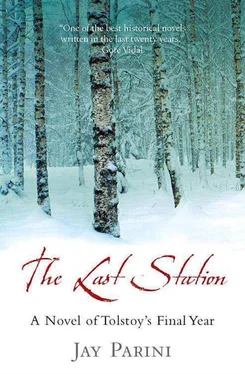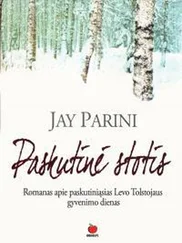‘Your father is the greatest author in Russia today,’ Bulgakov said.
‘Quite.’
‘I feel privileged to be here, Sasha. It is an honor I never dreamed of.’
I simply nodded. It pleased me to hear my father referred to in these terms, however jejunely. The family takes his genius too much for granted.
Bulgakov began talking of his family, his ambitions. He had been converted to Papa’s ideas through an acquaintance with a small group of Tolstoyans in Moscow, and now he hopes to live for God. The injustice of Russian society upsets him, he said. He was thoughtful and sincere. I really liked him, to my surprise. Unlike so many people around here, he has read Papa’s work carefully and found his own way to express many of the same ideas.
Suddenly Mama marched into the room, shouting, ‘Valentin Fedorovich! Come downstairs. I must show you a letter I received only this past week from a woman in Georgia.’ She led him awkwardly from the room. He was embarrassed, but he did not have the sense – or the wherewithal – to resist her.
That woman simply cannot bear it when anyone is alone with me. Let her read her ridiculous letter to young Bulgakov. He means nothing to me. I have my work before me, and this is enough.
If I’m in the right frame of mind, I actually like these wintry, overcast days when you live in a white cocoon. White cloud-scud sky, with snow hanging on the branches, meringue slices of clean, white snow. The ground is soft with the dust of snow, and your feet make a slight, muffled sound when you walk along the frozen paths. I like the blackbirds, too, and sparrows, so tenacious, enduring. Nothing scares them away. When I see blackbirds on the fence in the orchard, my heart fastens on them.
There is something going on behind my back, something to do with the will. Yesterday, I asked Lyovochka directly, ‘Has anyone approached you about your will? Has anything changed? You would tell me, wouldn’t you, if anything happened?’
He thinks he can give away everything we own: the house, the land, the copyright to all his works. Has he no sense of responsibility?
‘You mustn’t worry, Sonya,’ he said. ‘Nothing has happened.’ But I’m worried.
Is it so much to ask for, that my husband’s children should inherit his property, including the right to republish his work as they see fit when he is gone? They, too, must live. It is some years since we agreed that I should maintain control over everything he wrote before 1881. I am happy enough to let the world take the rest, leaving me with Anna Karenina, War and Peace , and all the early novels – the only ones that keep selling anyway. It’s almost comical that my husband believes the later works matter beyond a small circle of religious fanatics. Who wants to read books of theological speculation? Books that tell you that you’ve been doing everything wrong through your whole life?
I’ve been lying in bed with a headache, watching the snow fall, drinking tea. I cannot read. My head is tight as a drum, pounding. And I do not have the gramophone in my bedroom.
Music has been my one escape, an island in this tilting sea around me. Had my life gone better, I would have been a professional pianist. Tanayev, my teacher, assured me that my talent would have been sufficient. But Lyovochka has denied me even this.
He was impossible about Tanayev, so mean and jealous, like a silly schoolboy. My interest in that dear, sweet little man was entirely professional – or almost entirely. He is not, after all, an appealing man – not in any conventional way. He is short and porky, with red hair thinning on top; he refuses to trim that scrubby auburn beard of his. But his style! What style!
Tanayev understands how a woman in society should be treated. Alas, it has been a long time since I have been around people who understand that, people such as the friends who would call on Papa – courtiers and generals, men of rank in society. No wonder I feel lonely here, in the wilds, surrounded by Goths.
I remember seeing Tanayev for the first time, on the stage in Kiev. Tanya and I went to that concert by chance, but we both knew at once that we were in the presence of genius. We wept madly when he played the Appassionata . After the concert, waiting for his carriage, the poor man was surrounded by screaming, foolish women. Pelagya Vasilievna, who had been his childhood nurse and now accompanied him everywhere like a doting grandmother, tried to push them away. But it was useless, such was their passion. One foolish girl grabbed his red silk kerchief, ripping it to shreds. I could not bear to see such a travesty and instructed our footman to do something.
He walked bravely through the mob, shouting, ‘Make way for the Countess Tolstoy!’ Though embarrassed by the attention, I followed him. The crowd grew very still, and a path opened for me, almost miraculously, to the feet of Sergey Ivanovich. I felt like the Queen of the Ball.
‘It is a great honor,’ Tanayev said, kissing my hand.
‘You played marvelously well tonight,’ I said. ‘Especially the Appassionata . It is my favorite sonata.’
‘I thank you, Countess. Beethoven is not for everyone.’
I invited him to ride in my carriage, since his was nowhere to be seen, and he graciously accepted.
It was on the way to his hotel that I mentioned, in passing, that I, too, played the piano.
‘By comparison with you, of course, I’m a dreadful amateur,’ I said.
‘You do yourself an injustice, I’m sure,’ he said.
‘I wish that were true.’
‘Perhaps I could give you some lessons. Would that interest you, Countess?’
‘Me? You would instruct me?’
Imagine! He was an impossibly dear man, taking on such a beginner. That night, I lay awake in bed quivering. I would be taught by the man who had himself been discovered at the age of ten by Nikolai Rubinstein! The man who became Tchaikovsky’s protégé and friend! The teacher of Scriabin! My luck, it seemed, was turning.
That was shortly after the death of my dear little Vanechka. He was my best, my sweetest and dearest little boy, so kind and loving. I cannot bear to say his name or think of him. On the night he died, I went to his bedside and felt his tiny, fevered head. ‘I’m sorry to have wakened you, Mama,’ he said. ‘Sweet child,’ I cried. ‘My sweetest child!’
Lyovochka never understood my grief. Nor did he see that Tanayev offered a balm. Dear Sergey Ivanovich led me from darkness into light. But how bitter my husband grew, full of jealousy and hatred, small-minded, petty. His so-called disciples come here day after day now, worshiping him like Jesus Christ himself, and Lyovochka allows this to happen. He is so greedy for publicity, so thirsty for praise. If only they knew what I know…
Sergey Ivanovich came to Yasnaya Polyana frequently, but always against my husband’s will. The great Russian author, heir to Pushkin, peer of Dickens and Hugo, would lock himself in his study, avoiding the dinner table, sulking like a child whose mother has refused to give him a sweet. Sergey Ivanovich, of course, behaved superbly.
Our best times together were in Moscow. Sergey Ivanovich would play for hours at the grand piano in the front parlor. How he could play the polonaise! After, we would drink tea together, talk, or take little shopping tours of Hunters Row. Sergey Ivanovich loves his food, perhaps a little too passionately, but I was willing to cater to his whims. We would steal away to Trembles, the bakery, and buy dozens of tiny mince cakes, bonbons, and chocolate truffles. All the way home we’d stuff ourselves, giggling in the back of the sleigh, while old Emelyanych, our driver, scowled. What blissful days!
Читать дальше












